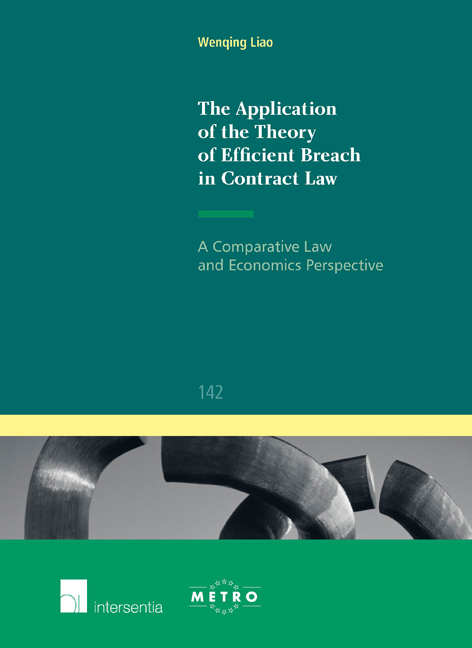 The Application of the Theory of Efficient Breach in Contract Law
The Application of the Theory of Efficient Breach in Contract Law Book contents
- Frontmatter
- Acknowledgements
- Contents
- List of Abbreviations
- List of Tables
- Chapter 1 Introduction
- Chapter 2 Economic Analysis of Contract and Contract Law
- Chapter 3 Efficient Breach in Law and Economics Theory
- Chapter 4 A Re-Examination of the Optimal Rule to Enhance Efficiency
- Chapter 5 Alternative Remedies and Efficient Breach
- Chapter 6 Efficient Breach and European Union Contract Law
- Chapter 7 Efficient Breach and Re-Negotiation in English Sales Law
- Chapter 8 Applying the Efficient Breach Doctrine to Chinese Commercial Sales Law
- Chapter 9 A Comparative Law and Economics Analysis of Efficient Breach in English Law, EU Law and Chinese Law
- Chapter 10 Concluding Remarks and Policy Recommendations
- References
- Table of legislation and European or international instruments
- Cases
- Valorization Addendum
- Ius Commune Europaeum
Chapter 9 - A Comparative Law and Economics Analysis of Efficient Breach in English Law, EU Law and Chinese Law
Published online by Cambridge University Press: 12 December 2017
- Frontmatter
- Acknowledgements
- Contents
- List of Abbreviations
- List of Tables
- Chapter 1 Introduction
- Chapter 2 Economic Analysis of Contract and Contract Law
- Chapter 3 Efficient Breach in Law and Economics Theory
- Chapter 4 A Re-Examination of the Optimal Rule to Enhance Efficiency
- Chapter 5 Alternative Remedies and Efficient Breach
- Chapter 6 Efficient Breach and European Union Contract Law
- Chapter 7 Efficient Breach and Re-Negotiation in English Sales Law
- Chapter 8 Applying the Efficient Breach Doctrine to Chinese Commercial Sales Law
- Chapter 9 A Comparative Law and Economics Analysis of Efficient Breach in English Law, EU Law and Chinese Law
- Chapter 10 Concluding Remarks and Policy Recommendations
- References
- Table of legislation and European or international instruments
- Cases
- Valorization Addendum
- Ius Commune Europaeum
Summary
In law and economics, the theory of efficient breach arises from a situation where non-performance of a contract, compared to its performance, might produce higher payoffs to the parties after the contract has been concluded. Under this situation, it is assumed that non-performance of the contract is economically more desirable than performance. Breach is one of the approaches to realizing non-performance. In order to achieve non-performance, the party who has to perform (promisor, obligor or seller) could either breach the contract or negotiate with the other party for a release from the contract. If the party contemplating breach is able to take the benefit and the cost of breach into account, he will breach only when the profit of doing so is higher than other choices. His choice of breach is considered to be efficient as long as he could still make profits after paying damages and the damages he pays could put the non-breaching party in as good a position as he could enjoy had the contract been performed.
The central question in this thesis is to what extent the sales law in different legal systems can promote efficient breach and efficiency. Efficiency is the central concept for evaluating remedy rules in different legal systems. In the real world, it is costly for contracting parties to draft perfect contracts ex-ante, which have considered all possible risks, as well as the other party's opportunistic behaviour that might occur after the conclusion of the contract. By the same token, achieving settlements ex-post might also be discouraged by the high negotiation costs. By providing various default rules as well as mandatory rules in relation to different risks, contract law may thus facilitate transactions for instance by filling the contract gap, disambiguating contract terms, motivating efficient behaviour as well as preventing opportunistic behaviour. According to the efficient breach theory, efficient contract rules should enable contracting parties to behave efficiently, for example to only breach a contract when it is efficient to do so but otherwise to take proper measures of performing their contract. This thesis focuses on how different contract law rules shape a seller's incentives to breach efficiently, or more broadly, to take efficient solutions in the situation when strictly performing a sales contract is less efficient than not performing it.
- Type
- Chapter
- Information
- The Application of the Theory of Efficient Breach in Contract LawA Comparative Law and Economics Perspective, pp. 249 - 288Publisher: IntersentiaPrint publication year: 2015


